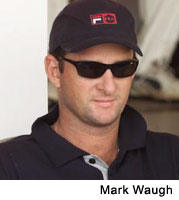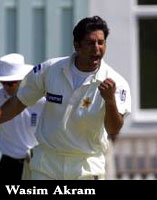Patience tested in anti-corruption quest
Daniel Laidlaw
It is growing increasingly difficult to believe that we are ever going to
see any more current cricketers thrown out of the game on corruption
charges.
After Mark Waugh and Martin Crowe became the latest current and former
players to be found not guilty on lack of evidence, the consensus was that
the ICC's Anti-Corruption Unit had essentially failed to deliver on its
task. Despite the resources allocated to it and the genuine dedication to
unearthing corruption, plus the release of an auspicious but ultimately
ambiguous preliminary report, we have still yet to see any more names
uncovered and punished after those published in the Indian CBI report.
 Eliminating corruption is obviously not merely about identifying and
banning the guilty but it's an important public step and a tangible indication of
progress. The fact that it has not occurred makes it seem like Sir Paul
Condon and the ACU have failed.
Eliminating corruption is obviously not merely about identifying and
banning the guilty but it's an important public step and a tangible indication of
progress. The fact that it has not occurred makes it seem like Sir Paul
Condon and the ACU have failed.
One problem with such comprehensive and necessarily lengthy investigations
is that it is very easy for those of us not privy to the process to become
frustrated and despair at the apparent lack of progress. There's nothing
like a quick resolution to a crisis once it has been identified. It hasn't
happened so the cynicism has mounted.
One by one, the reports from the various cricket boards of the world have
been released, all with predictable verdicts. England, Sri Lanka, New
Zealand, Australia - all have returned the same outcome, that without key
figure Mukesh Gupta speaking out in support of his claims to the CBI, the
accused has no case to answer. Only West Indies have yet to reach a
decision
on the allegations against Brian Lara, and there are no prizes for
guessing
what their verdict will be.
It is highly questionable anyway whether Gupta's allegations would have
amounted to anything even if he were prepared to support them to the ACU.
Without corroboration or evidence it would still have come down to his
word
against the accused, which was already the case. Exonerations under those
circumstances would have been more infuriating than the manner in which
they
eventually occurred.
Only India has been strong enough to punish its accused players on the
basis
of Gupta's testimony, aided by the additional corroboration and records
the
CBI was able to provide on its players.
In view of the starting point it had, it is mightily tempting to write off
the ACU's work as a failure. It had been provided more leads than could
ever
have been hoped for just a couple of years ago and has seemingly failed to
build upon them. Judging from Condon's reaction to the dissatisfaction at
the outcome of the latest national inquiry, he is feeling the pressure to
deliver some tangible progress.
Yet some patience is required on our behalf. The target date for
eradicating
corruption is 2003 and it is only fair to withhold final judgement on the
effectiveness of the ACU until it has reached the deadline it has set
itself. However, the ACU would be wise to note that whatever it achieves,
it
won't truly earn respect until it can uncover and punish a corrupt player
on
its own merits.
The results of the recent national enquiries can only be seen as failures,
regardless of whether natural justice and fairness prevailed. By sheer
weight of numbers and accuracy of prior allegations, we simply know all of
the accused cannot be innocent, which only adds to the frustration.
A day after the Greg Melick report found Mark Waugh had no case to answer,
Condon reacted to the criticism by using the ACU's prevention of the
fixing
of the recent England-Pakistan series as an indication of his unit's
success. But simply preventing the crimes without apprehending the
perpetrators is not enough. Without proving the identity of the corruptors
(presumably a major illegal syndicate if it is still attempting
match-fixing
in the knowledge of the ACU's existence) and the corruptees (we can make
highly educated guesses regarding their identities) the ACU could roam the
world monitoring series after series indefinitely. Eventually the force
with
the initiative, the proactive bookie, will escape the surveillance net and
deal with his targets and all the while the ACU will have made no
progress.
It's patently unsatisfactory and adds to the feeling of regression since
the
saga reached its zenith last year.
Another considerable public relations difficulty for the ACU is that we
are
now so inured to sensational corruption news that what would once have
been
seen as significant revelations are now viewed as insubstantial. An
attempt
to fix a Test series would once have been a major story but in the current
climate of desensitivity to match-fixing news, it seems rather tame.
Currently the ACU is treading water in its attempts to stave off further
corruption. It is successfully staying afloat but not making any headway
against the tide. It's important that the ACU has achieved its aim of
reducing and stabilising the level of malpractice but ultimately it has to
accomplish more than just preserving the integrity of current and future
series. Sooner rather than later it is time to detect and remove the
malfeasance at its source, the bookmaking syndicates and participating
players and administrators, instead of reacting to its result. The clock
continues to tick.
Whether or not anything concrete emerges from Condon's latest hints
remains
to be seen. For now, the players most recently reprieved can consider
themselves fortunate.
Mark Waugh's reaction to the finding of his having no case to answer
resembled that of Herschelle Gibbs in April 2000, when Gibbs denied his
involvement after Cronje had initially implicated just himself. It was
apparent even then that Gibbs was lying and Waugh's denials since have had
a
similarly hollow ring.
 With all the corruption culprits, it seems as though there are two
personalities involved. There are the cricketers we recall with varying
degrees of respect for their on-field exploits, and then there are the
venal
people deserving of our wrath. Even now it's difficult to reconcile the
two.
With all the corruption culprits, it seems as though there are two
personalities involved. There are the cricketers we recall with varying
degrees of respect for their on-field exploits, and then there are the
venal
people deserving of our wrath. Even now it's difficult to reconcile the
two.
It's the same with those under suspicion who are still playing. A case in
point is Wasim Akram, by anyone's measure one of the greatest fast bowlers
to grace the game. Wasim still commands enormous respect, even though
Justice Qayyum had grave doubts over his integrity fined him for not being
"above board," in addition to being stripped of the captaincy. Wasim was
essentially found to be a "little bit" guilty, yet is still an admired
presence because of his achievements. As with Azharuddin, Cronje and
Malik,
his playing record and status as a cricketer will not be diminished
whether
he is eventually banned or not. Only his moral standing will have
suffered.
Performances cannot be retrospectively altered and nor should they be.
Pure
cricketing achievements still stand regardless of what occurs in the
future
lives of players. However much the guilty betrayed their sport and
country,
it's difficult to find an angle that decrees their records as players can
be
diminished. When you consider it and arrive at the bare facts, if the
players involved were guilty of throwing their wickets away or bowling
poorly for money, their records -- had they not been corrupt -- would have been
even better. In Wasim's case, as the leading wicket-taker in one-day
international history, it's a remarkable thought.
The betting scandal - the complete coverage
More Columns
Mail Daniel Laidlaw